On September 6, many of the nearly 60 Hampden-Sydney students who had engaged in international study during the past year gathered to talk about their experiences.
Most frequently used expressions: “I would go back in a heart beat,” “It was good for me,” “I made great friends,” “It made me appreciate Hampden-Sydney.” Consensus: the food was so, so; it rains a great deal in the British Isles, much beer and wine was consumed; we learned a lot, and it was an incredible experience.
 For Hampden-Sydney students who grew up in small towns, one of the greatest adjustments was to city life. During a metro strike in Paris, David Price ’02 from Collinsville, VA, who was with the Sweet Briar Program, had to walk two and half hours to class. “Really, once you get to understand how the French think and what their ideas are and what their customs are, they are very nice people, and I made numerous friends.”
For Hampden-Sydney students who grew up in small towns, one of the greatest adjustments was to city life. During a metro strike in Paris, David Price ’02 from Collinsville, VA, who was with the Sweet Briar Program, had to walk two and half hours to class. “Really, once you get to understand how the French think and what their ideas are and what their customs are, they are very nice people, and I made numerous friends.”
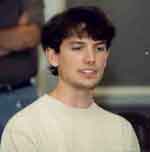 For Edward Finnerty ’02 from Charleston, SC, Dublin was a challenge. Good public transportation is nonexistent, “everyday something happened, but you just had to laugh.” Despite the municipal shortcomings, Teddy, who studied psychology at Trinity College, asserts that in Dublin, “every night was a brand new experience; it was really fun. Anybody our age should definitely go there…just to witness the madness.”
For Edward Finnerty ’02 from Charleston, SC, Dublin was a challenge. Good public transportation is nonexistent, “everyday something happened, but you just had to laugh.” Despite the municipal shortcomings, Teddy, who studied psychology at Trinity College, asserts that in Dublin, “every night was a brand new experience; it was really fun. Anybody our age should definitely go there…just to witness the madness.”
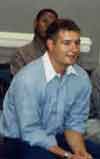 Logan Wanamaker ’02 spent a year in Granada. He stayed with a host family for the first semester. “It was a little overwhelming when they picked me up and drove me into the city; I am from a small town [Durango, CO] and had never lived in a city.” Second semester, Logan lived in an apartment downtown with two young Italian women and two young Spanish women, which was “a big switch from Hampden-Sydney. First semester I got in a rut and I was hanging out with Americans and going out with Americans but once I moved in with my other roommates, my Spanish really took off.” He spent free days on the beach at la Costa del Sol and on weekends went skiing in the Sierra Nevada. “I brought my skis over and made great friends up at the ski resort, so I had buddies that I got to go skiing with. To have something that you really enjoy to share with someone from another country was really special to me.” He traveled all over Spain, to southern Portugal, Morocco, into the Sahara by camel to Marrakech, to Majorca, and through the Basque country. “Now when I look at a map of Spain I know what every town looks like and all the history behind it. It was an incredible experience.”
Logan Wanamaker ’02 spent a year in Granada. He stayed with a host family for the first semester. “It was a little overwhelming when they picked me up and drove me into the city; I am from a small town [Durango, CO] and had never lived in a city.” Second semester, Logan lived in an apartment downtown with two young Italian women and two young Spanish women, which was “a big switch from Hampden-Sydney. First semester I got in a rut and I was hanging out with Americans and going out with Americans but once I moved in with my other roommates, my Spanish really took off.” He spent free days on the beach at la Costa del Sol and on weekends went skiing in the Sierra Nevada. “I brought my skis over and made great friends up at the ski resort, so I had buddies that I got to go skiing with. To have something that you really enjoy to share with someone from another country was really special to me.” He traveled all over Spain, to southern Portugal, Morocco, into the Sahara by camel to Marrakech, to Majorca, and through the Basque country. “Now when I look at a map of Spain I know what every town looks like and all the history behind it. It was an incredible experience.”
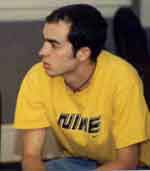 McKay Johnson ’02 from Atlanta, GA, studied international business at the University of Victoria in Wellington, New Zealand. He traveled all over New Zealand, which is “absolutely beautiful, very green, mountains everywhere.” The New Zealanders call hiking tramping, and McKay did plenty of tramping. The study was initiative based. There were no textbooks; it was up to you how much you learned, and people there study “real hard.” The New Zealanders are “absolutely great people, friendly, real nice.” He encountered the indigenous Moari culture that, although poorly treated in the beginning, the New Zealanders did not try to exterminate them as was done to the indigenous populations in the United States and Australia. Today, the two cultures live well together. McKay visited Australia, Thailand, Malaysia, and Burma. “It is incredible [in Burma] to see the struggle that is going on for human rights.” He spent a month in China traveling from Hong Kong to Beijing meeting local people. “It was an incredible experience. The government is screwed up, but I cannot tell you how nice the people are and how beautiful the country is.”
McKay Johnson ’02 from Atlanta, GA, studied international business at the University of Victoria in Wellington, New Zealand. He traveled all over New Zealand, which is “absolutely beautiful, very green, mountains everywhere.” The New Zealanders call hiking tramping, and McKay did plenty of tramping. The study was initiative based. There were no textbooks; it was up to you how much you learned, and people there study “real hard.” The New Zealanders are “absolutely great people, friendly, real nice.” He encountered the indigenous Moari culture that, although poorly treated in the beginning, the New Zealanders did not try to exterminate them as was done to the indigenous populations in the United States and Australia. Today, the two cultures live well together. McKay visited Australia, Thailand, Malaysia, and Burma. “It is incredible [in Burma] to see the struggle that is going on for human rights.” He spent a month in China traveling from Hong Kong to Beijing meeting local people. “It was an incredible experience. The government is screwed up, but I cannot tell you how nice the people are and how beautiful the country is.”
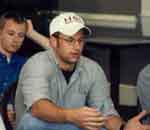 Bert Drummond ’02 from Hampton, VA, participated in the Antioch College Program in Germany, Poland, Hungary, and the United Kingdom. There were 11 students in the program with a 23-year old Polish leader: according to Bert, “she is beautiful with a moving personality.” The program centered on an independent research project based on interviews and experiences. “Our professor, Manfred McDowell, is a brilliant man and an atheist, which contrasted to me as a Christian, and one of my majors is religion. My independent study had to do with the theory of secularization in terms of Europe. I had to be extremely objective and use nothing but facts and data in writing. It was really challenging for me and healthy. Poland and Hungary are extraordinary places with extraordinary people. Hungary has a large Romanian population who, believe it or not, are more discriminated against than African-Americans in the United States. In the Polish villages, people are under such [economic] duress. They are in a completely different situation than we are; yet, we had so much in common when we talked to each other. I lived with a Jewish family in Budapest; Jewish life in Europe, especially Central Europe, is an whole different world.”
Bert Drummond ’02 from Hampton, VA, participated in the Antioch College Program in Germany, Poland, Hungary, and the United Kingdom. There were 11 students in the program with a 23-year old Polish leader: according to Bert, “she is beautiful with a moving personality.” The program centered on an independent research project based on interviews and experiences. “Our professor, Manfred McDowell, is a brilliant man and an atheist, which contrasted to me as a Christian, and one of my majors is religion. My independent study had to do with the theory of secularization in terms of Europe. I had to be extremely objective and use nothing but facts and data in writing. It was really challenging for me and healthy. Poland and Hungary are extraordinary places with extraordinary people. Hungary has a large Romanian population who, believe it or not, are more discriminated against than African-Americans in the United States. In the Polish villages, people are under such [economic] duress. They are in a completely different situation than we are; yet, we had so much in common when we talked to each other. I lived with a Jewish family in Budapest; Jewish life in Europe, especially Central Europe, is an whole different world.”
“We stayed in London for a month. We went from Poland where people are warm, compassionate, and friendly to London where everyone is not so warm, compassionate, and friendly. England is an extremely secular society. I think I saw the sun for maybe two consecutive hours on one day, but you get used to it after awhile. It was so fun, so fun.”
 Six Hampden-Sydney students participated in the Virginia Program at Oxford and studied at St. Anne’s College. According to Kerr Ramsay of Raleigh, NC, dormitory life was less than luxurious, “the shower was the size of a toilet,” but “the library you study in was founded by James I, I think about the time of Jamestown. In the upper reading rooms you can see where Charles I had his government during the English Civil War and there is a place where you can still see the burn marks where Bloody Mary [Mary Tudor] burned Protestants at the stake.”
Six Hampden-Sydney students participated in the Virginia Program at Oxford and studied at St. Anne’s College. According to Kerr Ramsay of Raleigh, NC, dormitory life was less than luxurious, “the shower was the size of a toilet,” but “the library you study in was founded by James I, I think about the time of Jamestown. In the upper reading rooms you can see where Charles I had his government during the English Civil War and there is a place where you can still see the burn marks where Bloody Mary [Mary Tudor] burned Protestants at the stake.”
 Andrew Walshe ’02, from Herndon, VA, spent a year at the London School of Economics. “It was more work than I thought it would be, but it was a good experience.” The school was filled with a very diverse group of people and “absolutely brilliant” people. “I was just hanging on for dear life at the beginning, but, by the end of it, I was doing OK, and everything worked out really well. We had amazing lecturers. It was tremendous. After lectures, you go to class with graduate students; every graduate assistant I had was from a different country: England, Germany, Italy, Greece, and Holland. On all, it was good experience and a good time. Living in London was tremendous.”
Andrew Walshe ’02, from Herndon, VA, spent a year at the London School of Economics. “It was more work than I thought it would be, but it was a good experience.” The school was filled with a very diverse group of people and “absolutely brilliant” people. “I was just hanging on for dear life at the beginning, but, by the end of it, I was doing OK, and everything worked out really well. We had amazing lecturers. It was tremendous. After lectures, you go to class with graduate students; every graduate assistant I had was from a different country: England, Germany, Italy, Greece, and Holland. On all, it was good experience and a good time. Living in London was tremendous.”
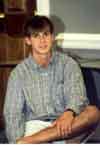 Andy Yarborough ’02, Gulf Shores, AL, studied for a semester at James Cook University in Cairns, Australia, a small, about 3000, university on the northeast coast. He lived in student lodge with students from all over world. “The land is unbelievable: it is nearly impossible to be bored: you can draw so much enjoyment from the land.” In his indigenous studies courses, Andy learned that the treatment of Aborigines was comparable to that of Native Americans, and race relations in Australia are still delicate. He went out into different aboriginal communities and befriended a head of a clan who took him out into the bush, interpreted aboriginal rock art, and to ancient initiation sites. “I was lucky to be able to go and to get in with the people I did. I saw places where land is still totally pristine and untouched by civilization, a far cry from anything that I have seen in the States.”
Andy Yarborough ’02, Gulf Shores, AL, studied for a semester at James Cook University in Cairns, Australia, a small, about 3000, university on the northeast coast. He lived in student lodge with students from all over world. “The land is unbelievable: it is nearly impossible to be bored: you can draw so much enjoyment from the land.” In his indigenous studies courses, Andy learned that the treatment of Aborigines was comparable to that of Native Americans, and race relations in Australia are still delicate. He went out into different aboriginal communities and befriended a head of a clan who took him out into the bush, interpreted aboriginal rock art, and to ancient initiation sites. “I was lucky to be able to go and to get in with the people I did. I saw places where land is still totally pristine and untouched by civilization, a far cry from anything that I have seen in the States.”